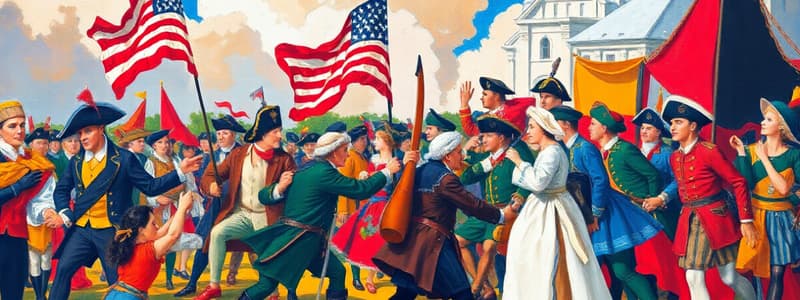Podcast
Questions and Answers
What did the Proclamation of 1673 primarily prevent colonists from doing?
What did the Proclamation of 1673 primarily prevent colonists from doing?
- Engaging in trade with Native Americans
- Forming alliances with foreign countries
- Establishing local governments
- Acquiring land west of the Appalachian Mountains (correct)
Which of the following was a direct consequence of the Battle of Saratoga?
Which of the following was a direct consequence of the Battle of Saratoga?
- The French allied with the American forces (correct)
- The British lost some of their key military leaders
- Colonial morale decreased significantly
- Britain strengthened its naval patrols
How did the Intolerable Acts influence the path toward the American Revolutionary War?
How did the Intolerable Acts influence the path toward the American Revolutionary War?
- They were perceived as a violation of the colonists' liberties. (correct)
- They resulted in increased trade with Britain.
- They led to the creation of a loyalist movement.
- They encouraged greater British support for the colonies.
Which excerpt from the Declaration of Independence signifies colonists' grievances regarding taxation?
Which excerpt from the Declaration of Independence signifies colonists' grievances regarding taxation?
What was one of the primary outcomes of the Proclamation of 1673 for colonial settlers?
What was one of the primary outcomes of the Proclamation of 1673 for colonial settlers?
What did King George III's response to the growing dissent in the colonies ultimately lead to?
What did King George III's response to the growing dissent in the colonies ultimately lead to?
Which statement best describes why many colonists opposed the Intolerable Acts?
Which statement best describes why many colonists opposed the Intolerable Acts?
Which aspect of the Declaration of Independence highlights the concept of government consent?
Which aspect of the Declaration of Independence highlights the concept of government consent?
Flashcards are hidden until you start studying
Study Notes
The Proclamation of 1763
- Issued by King George III after the French and Indian War
- Prohibited colonists from settling west of the Appalachian Mountains
- Aimed to prevent conflicts with Native Americans and maintain control over the vast territory
- Created tension with colonists who viewed it as an infringement on their westward expansion
Battle of Saratoga
- A turning point in the American Revolutionary War
- American victory under the command of General Horatio Gates
- A key factor in convincing France to enter the war as an ally of the colonists
- Helped secure crucial foreign aid and resources for the American cause
The Intolerable Acts
- A series of punitive laws enacted by the British Parliament in response to the Boston Tea Party
- Closed the Port of Boston, imposed military rule on Massachusetts
- Restricted town meetings and expanded the power of the royal governor
- Sparked widespread outrage and resistance among the colonists, leading to the outbreak of the Revolutionary War
Representation in the British Parliament
- The Declaration of Independence states that the colonists were unhappy about "Taxation without Representation"
- Colonists argued that they lacked representation in Parliament and therefore should not be subject to its taxes
- This lack of representation fuelled a growing sense of injustice and contributed to the growing movement for independence
The Declaration of Independence
- The excerpt about "For imposing Taxes on us without our Consent" is the statement that best explains why colonists were unhappy about their lack of representation in the British Parliament
- This statement reflects the principle of "no taxation without representation," a key grievance of the colonists
- It illustrates their belief that only those who consent to being taxed should be subject to taxation
Studying That Suits You
Use AI to generate personalized quizzes and flashcards to suit your learning preferences.




